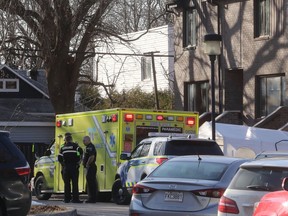A coroner’s report reveals that days before he killed his wife and sons, a Pointe-aux-Trembles man had signed a peace bond at the Montreal courthouse.

Article content
A provincial coroner has released a report following a public inquiry held last year into the deaths of a woman and her two young sons in Pointe-aux-Trembles at the hands of her husband, followed by his mysterious suicide at a hospital in Joliette.
On Dec. 9, 2019, Nabil Yssaad was inside his family’s home despite being estranged from his wife, Dahia Khellaf, when he strangled her and their two young sons, Adam and Aksil. The following day, he drove to Joliette, entered a hospital and headed to the sixth floor, where psychiatric evaluations are done, and took his own life.
Advertisement 2
Story continues below
Article content
The public inquiry did not reveal why Yssaad chose the hospital as the place to end his life. Despite Khellaf’s repeated requests that her husband undergo a mental health evaluation, there was no record of him being treated in Joliette. The Sûreté du Québec asked the Montreal police to inform Khellaf of the suicide, but the bodies of the homicide victims were discovered the day after Yssaad died.
The report filed by coroner Andrée Kronström reveals that Yssaad was not supposed to be anywhere near Khellaf because, just days earlier, he signed a peace bond in a case at the Montreal courthouse where he was charged with conjugal violence and uttering a threat to pierce Khellaf’s eye with a pair of scissors. He assaulted Khellaf while trying to grab a document from her hand as they left a financial institution on Aug. 24, 2018. While they struggled, Yssaad twisted her arm and bit her hand.
When he agreed to sign the peace bond, Yssaad was acquitted of the criminal charges, but he was required to keep a distance from Khellaf.
From the moment that Yssaad was charged, Khellaf told prosecutors that she didn’t want to see him end up with a criminal record and asked that he be treated for what she suspected was a serious mental health problem. When Yssaad made his first court appearance, he was ordered to undergo an urgent psychosocial evaluation, referred to in French as an Urgente psychosocial (UPS), at the Montreal courthouse.
Article content
Advertisement 3
Story continues below
Article content
“(A mental health expert) attached to the Philippe-Pinel National Institute of Forensic Psychiatry met with Mr. Yssaad for around 20 minutes and noted no active mental illness, no suicidal danger. Mr. Yssaad talked about the future and did not indicate any extreme violence. For him, the incident where Mr. Yssaad threatened Ms. Khellaf by saying he would pierce her eye was relatively minor compared to the seriousness of the cases seen at the Philippe-Pinel National Institute of Forensic Psychiatry. (The expert) recommended that the court apply ‘usual and normal procedures’,” Kronström noted in her report.

Yssaad was granted a conditional release after a judge was informed of the expert’s opinion.
The coroner’s report paints a portrait of a marriage that never worked.
“Ms. Khellaf and Mr. Yssaad, both of Algerian nationality, got married in 2012. Ms. Khellaf accepted the marriage proposal without knowing her future husband,” the coroner wrote, explaining that Khellaf had been living in Canada since 2009 and was a Canadian citizen when she began “sponsorship procedures so that her husband could join her. After two years and having done everything to obtain his visa, (Yssaad) arrived in Quebec in 2014, but did not feel well received here.”
Advertisement 4
Story continues below
Article content
Early on in their relationship, Yssaad insisted that Khellaf watch “a 1988 film that represents his view of male-female relationships. This film depicted unequal relationships where violence and control are omnipresent. We see men caning their wives and forcing them to have intimate relations. The plot ends with the death of the humiliated husband.”
Yssaad was unable to hold down a job during the marriage and Khellaf complained to people she knew that this put a financial strain on her. She had a steady job at a financial institution.
The goal of a coroner’s public inquiry is to find ways to prevent similar deaths. It is not intended to assign blame.
“Since 2019, significant progress has been made to protect victims of domestic violence. The Rebuilding Trust report (prepared by a committee of more than 20 experts for the National Assembly), with its 190 recommendations, became the turning point of a profound transformation. I note that the trajectory of Ms. Khellaf, Mr. Yssaad and their children is echoed in several findings from this report,” the coroner wrote.
Advertisement 5
Story continues below
Article content
“However, there is still a long way to go. Domestic violence concerns a large number of actors and their actions must be concerted to equip victims, children and perpetrators of domestic violence whose trajectory remains to be defined.”
Included among the 19 recommendations in the report are two directed specifically at the city of Montreal. She asked that the city grant the Montreal police “the resources to increase the number of staff dedicated to the section specializing in domestic violence.”
She also called on the Montreal police to “strengthen its specialized section team (formed three years ago) by including representatives of organizations providing assistance to perpetrators of domestic violence.”
The squad was created in 2021 and consists only of a lieutenant, four detectives and support staff. It deals with cases of intimate-partner violence where there appears to be a risk of reoffending or a homicide.
People facing intimate-partner violence can contact SOS Violence Conjugale 24 hours a day at 1-800-363-9010.
People struggling with mental-health issues can call Info-Social at 811, Option 2. If you are having thoughts of suicide, call the Suicide Crisis Helpline at 988, or 911.
Recommended from Editorial
Advertisement 6
Story continues below
Article content
Article content


Comments